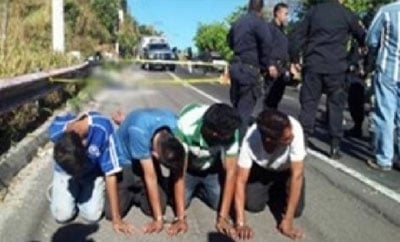

Gang members accused of murdering a policeman in January
El Salvador’s top prosecutor says he will use the government’s anti-terrorism laws to prosecute gang members who attack police, opening the way for even tougher persecution of gangs and further blurring the lines between organized crime and terrorism in the region.
Salvadoran Attorney General Luis Martinez announced that the Special Law Against Acts of Terrorism would now be applied to individuals and groups behind attacks against police, which have risen substantially so far in 2014, reported El Diario de Hoy.
“Terrorists be warned, you will be pursued and processed for your cowardly attacks against society and our brave police,” Martinez said on Twitter.
Terroristas estén advertidos serán perseguidos y procesados por sus ataques cobardes contra la sociedad y contra valientes policías.
— luis martinez (@luism_abogado) April 15, 2014
The announcement followed the murder of an agent from the police’s anti-extortion unit, which took the number of police killed so far this year to three, and the number of attacks against police carried out by gangs to over 55, according to police deputy director Mauricio Ramirez Landaverde.
The move received cross-party backing from members of the congressional security commission, who acknowledged that the law was not intended to deal with gangs and criminals but argued that the gangs’ actions justified its use, reported La Prensa Grafica.
El Salvador’s anti-terrorism law is vaguely worded when it comes to defining terrorism, saying only that actions should show “evidence of intent to provoke states of alarm, fear or terror in the population, place in imminent danger or affect the life or physical or mental integrity of people.”
Included in the list of crimes that can be prosecuted as terrorist acts, are attacks against “public officials or public authorities,” which together with the vague definition of terrorist motives could open the way for prosecution of gangs behind the attacks — predominantly the “maras” of Barrio 18 and Mara Salvatrucha (MS13).
As InSight Crime has reported, the links between terrorism and organized crime have grown in recent years, but this almost always takes the form of a mutually beneficial and often transient business arrangement. Some experts argue that the terror tactics of criminal groups mean they should be classified as terrorists whatever their motives, and other countries such as Brazil have already introduced legislation defining terrorism by act instead of motive.
However, in today’s climate terrorism is a politically charged word that has become a catchall justification for hardline policies. It has also been used by governments around the world to restrict civil liberties, skirt judicial norms and to persecute whoever the government sees as undesirable — from criminals to protesters. Under these circumstances, conflating gangs and terrorism risks fuelling abuses of power in the fight against organized crime.